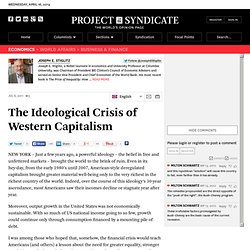

Freefall: Free Markets and the Sinking of the Global Economy: Amazon.co.uk: Joseph Stiglitz. 'Freefall' Excerpt: Too Late To Fix The Biggest Banking Blunder In History? Reprinted from Freefall by Joseph Stiglitz. Copyright (c) 2010 by Joseph E. Stiglitz. Used with permission of the publisher, W.W. Norton & Company, Inc. The entire series of efforts to rescue the banking system were so flawed, partly because those who were somewhat responsible for the mess--as advocates of deregulation, as failed regulators, or as investment bankers--were put in charge of the repair. Worse still were the implications for governance. The U.S. government did something worse than trying to re-create the financial system of the past: It strengthened the too-big-to-fail banks; it introduced a new concept--too-big-to-be- financially-resolved; it worsened the problems of moral hazard; it burdened future generations with a legacy of debt; it cast a pallor of the risk of inflation over the U.S. dollar; and it strengthened many Americans' doubts about the fundamental fairness of the system.
The Meltdown According to Stiglitz. Freefall:America, Free Markets, andthe Sinking of the World EconomyBy Joseph E. StiglitzW.W. Norton & Co., 361 pp; $27.95 Barack Obama ran for President on the promise of "change we can believe in. " When it comes to the financial crisis, he has instead "only slightly rearranged the deck chairs on the Titanic," writes Joseph E. Stiglitz in Freefall, his unsparing new account of the meltdown and its aftermath. Stiglitz, a Nobel prize-winning economist, is perhaps the closest thing we have to John Maynard Keynes in both his theoretical outlook and his cogent kibitzing of policymakers. Although Stiglitz spends much of the book exploring what went wrong and why—"peeling back an onion," he calls it—his emphasis is on the future, not the past. The President did engender a sense of hope, he writes. Obama also brought in Lawrence Summers, who boasted of having ensured during his stint as Bill Clinton's Treasury Secretary that derivatives would stay unregulated.
Joseph E. Stiglitz - I Dissent: Unconventional Economic Wisdom. The Ideological Crisis of Western Capitalism - Joseph E. Stiglitz. Exit from comment view mode.

Click to hide this space NEW YORK – Just a few years ago, a powerful ideology – the belief in free and unfettered markets – brought the world to the brink of ruin. Even in its hey-day, from the early 1980’s until 2007, American-style deregulated capitalism brought greater material well-being only to the very richest in the richest country of the world. Indeed, over the course of this ideology’s 30-year ascendance, most Americans saw their incomes decline or stagnate year after year. Moreover, output growth in the United States was not economically sustainable. I was among those who hoped that, somehow, the financial crisis would teach Americans (and others) a lesson about the need for greater equality, stronger regulation, and a better balance between the market and government.
In the US, this right-wing resurgence, whose adherents evidently seek to repeal the basic laws of math and economics, is threatening to force a default on the national debt. Josephstiglitz.com.